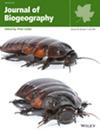Global Change Likely to Promote the Expansion of the Quagga Mussel (Dreissena bugensis) in Europe
Abstract
Aim
Invasive aquatic species are a pressing concern for environmental managers due to their significant impacts and high eradication costs. The Ponto-Caspian region is a notable source of aquatic invasive species, with over 40 invaders currently affecting freshwater ecosystems throughout Europe. Among these, the quagga mussel (Dreissena bugensis) stands out due to its swift colonisation and disruptive ecological effects. We hypothesise that climate change will lead to an increased range for the quagga mussel, similar to its congener, the zebra mussel (Dreissena polymorpha).
Location
The risk assessment area of this study covers the European Union and United Kingdom (EU27 + UK) under climate change scenarios for 2050 and 2070.
Taxon
Mollusca, Bivalvia, Dreissenidae, Dreissena bugensis.
Material and Methods
We used the global distribution of the species including 818 occurrences from the Global Biodiversity Information Facility (GBIF) and 430 additional records from an extensive literature review. We used species distribution models (SDM) based on climate and topography to calculate the risk of establishment of the quagga mussel by biogeographic region, country and major catchment. We also evaluated how the risk may change under 2050 and 2070 climate change scenarios. Models were calibrated with data pre-2020 and validated with data from 2021 to 2024, showing a 92% success classification of the more recent occurrences.
Results and Discussion
SDM revealed that climate suitability for the quagga mussel is highest along the Danube, Main–Rhine, Meuse and Moselle Rivers. Climate change is predicted to elevate the likelihood of establishment in the Boreal region, with a 60%–79% increase in suitability, while suitability remains low in the Mediterranean regions (18%–27% decrease in suitability). Climate change may indirectly facilitate the species' expansion through new water infrastructure, such as reservoirs and inter-basin water transfers, constructed in response to increasing extreme weather events. This study underscores the need for proactive management strategies to mitigate the mussel's expanding range and impact, particularly in regions vulnerable to climate change.


 求助内容:
求助内容: 应助结果提醒方式:
应助结果提醒方式:


